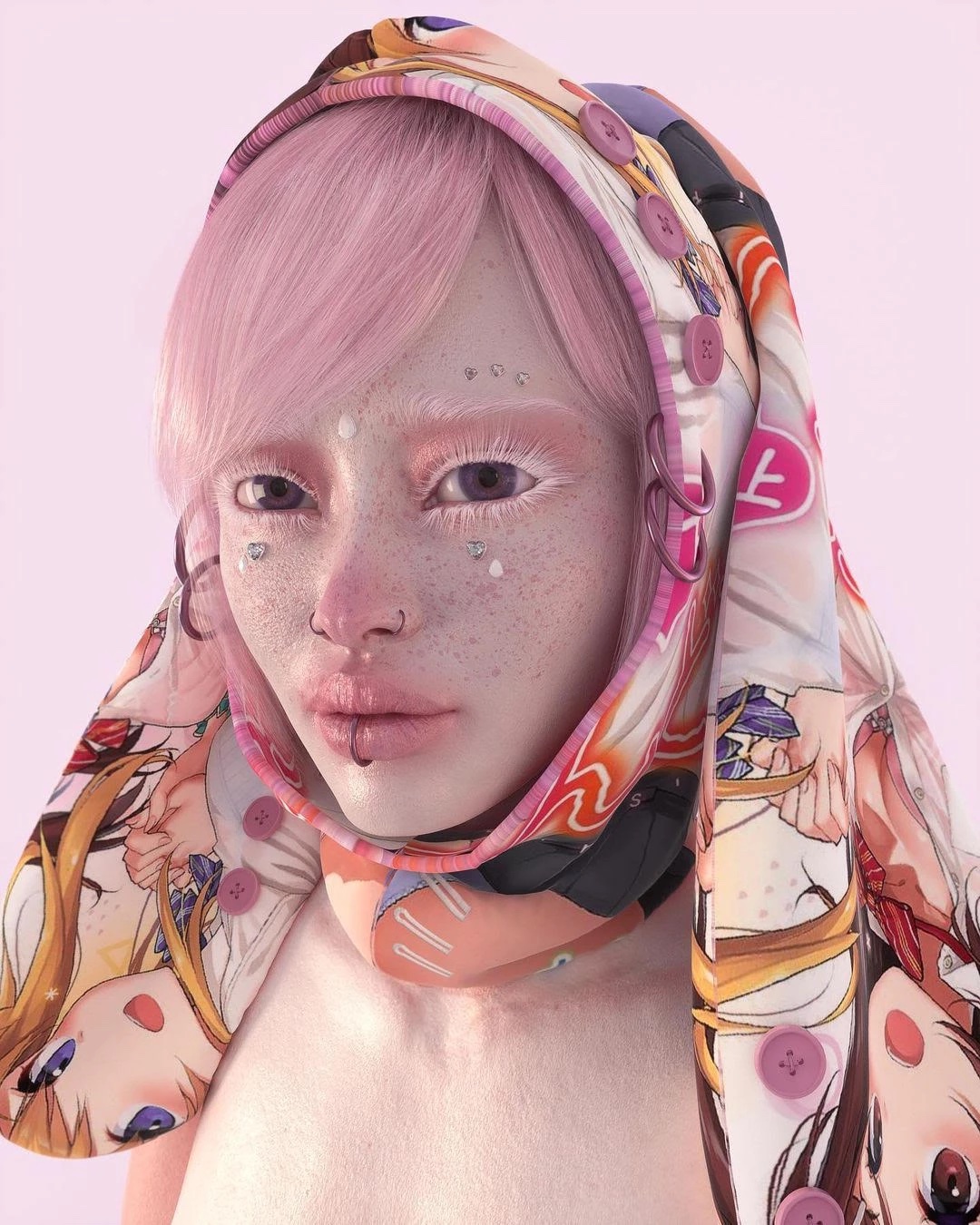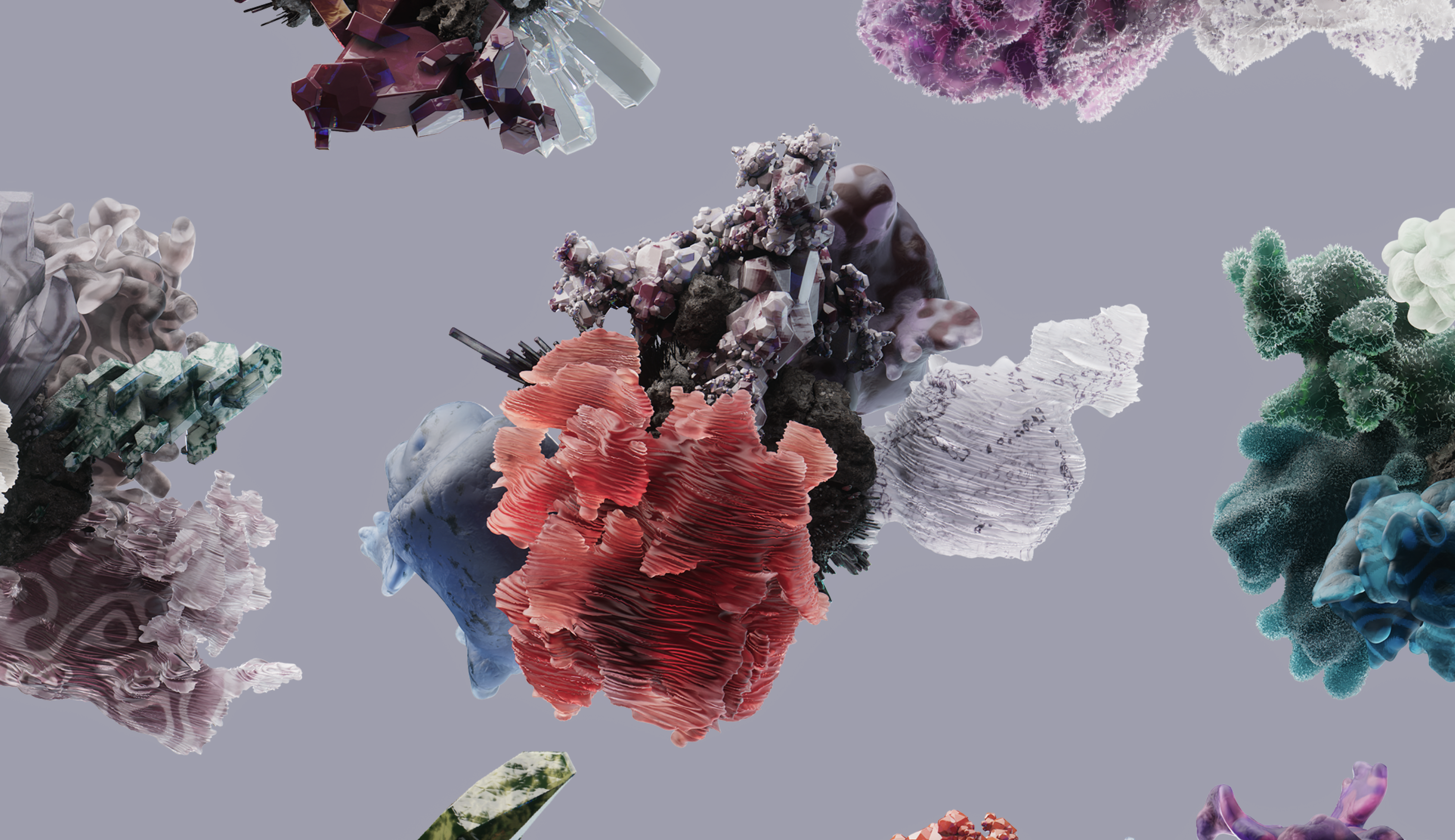JUNKYARD on the Rubber Hose Aesthetic
If you’re unfamiliar with the term rubber hose, you’ll surely recognize the zany and bouncy animation style and characters...
Created over a century ago, the style was named after the way the limbs of the character moved, similar to a rubber hose. From Felix the Cat to Betty Boop to Mickey Mouse to Popeye, this animation approach is widely considered to be the quintessential, original cartoon style.
Popularized in the early 1920s, rubber hose style animation, also known as inkblot animation, laid the foundation and framework for future generations of artists and animators. Today, I had the opportunity to meet with JUNKYARD, a South African-born and raised artist currently residing in Los Angeles, California. In his work, JUNKYARD revitalizes the vintage style depicting iconic cartoons with his own dark and twisted elements. As a self-proclaimed “person who doesn’t like doing interviews,” I was lucky enough to sit down with him in his inspired studio in DTLA to talk about his history, influences, process, his upcoming project KREEPY KLUB, and much more.
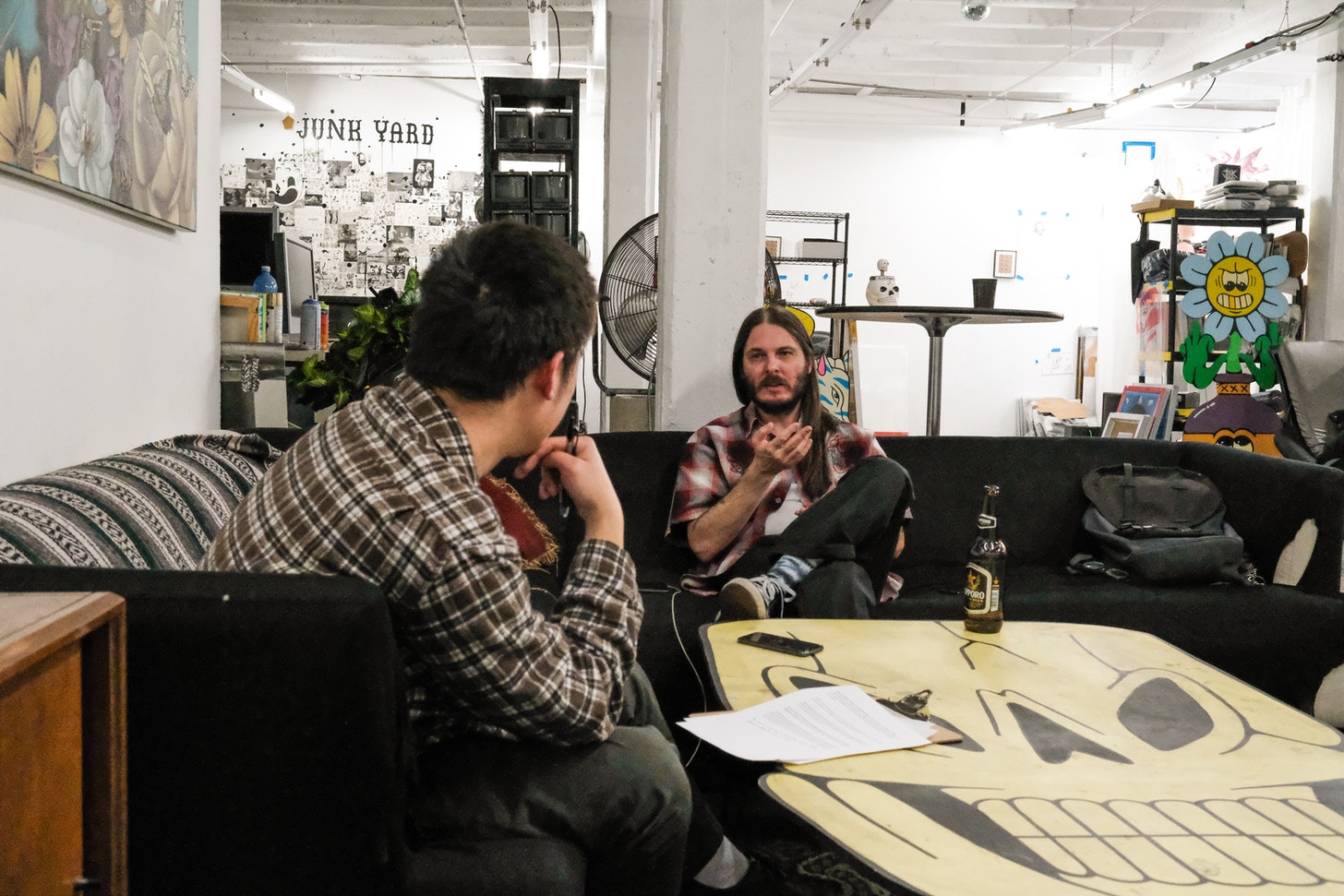
Where are you from? Can you tell me a little bit about your upbringing and childhood?
I'm originally from South Africa, born and raised there. Born in Port Elizabeth, but moved basically everywhere around South Africa and Namibia. My parents were both teachers at the time, so we moved around a lot.
Has growing up in South Africa helped shape your style?
The funny part is that most of my influences have always been from America and watching American shows in South Africa, cartoons we don't have. We didn't have a ton of things to watch in South Africa, we had basically two stations growing up, so the morning cartoons were, you know, Tom & Jerry, those kinds of things. Daffy Duck, Donald Duck. Those are the cartoons that we used to watch as kids, so it's always really been American influences.
Is there anything that's only available in South Africa that inspired you?
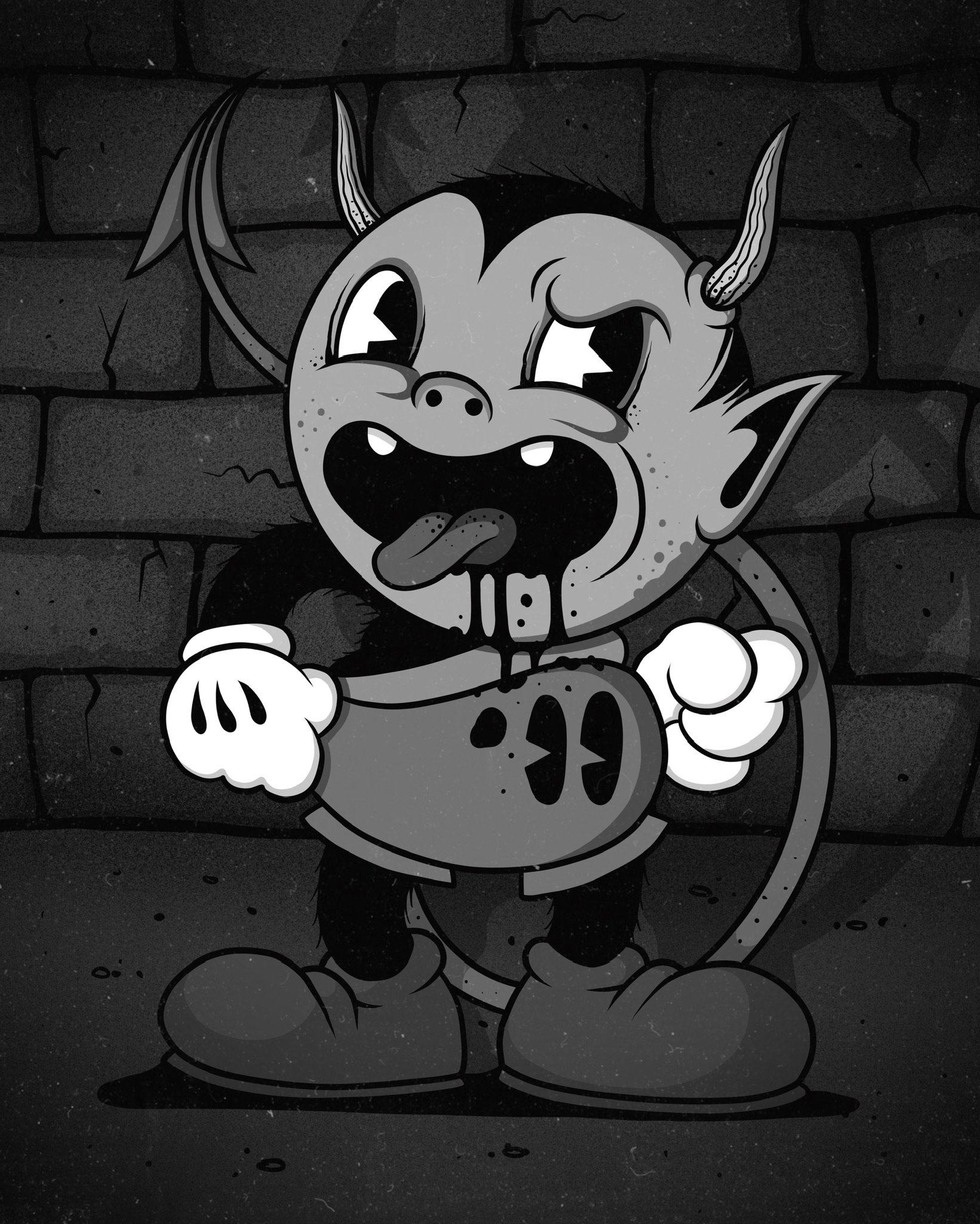
Before discovering rubber hose style, what other art styles have you practiced?
Oh my god, I've done basically every single style that you can think of. A lot of it was based on more of a graphic design kind of vibe, where it's like a more logo-centric kind of stuff and not so much character-based as what I'm doing now. But most of it is just kind of like finding my own style.
The JUNKYARD style has always kind of been there, the way I drew the eyes and the hands and things like that. I've been doing that for, I think the longest I can remember back was probably 2006 when I was drawing it like that. But it was just something that I was doing, you know, it's just one of my rotations. I would throw those kinds of characteristics in there. And then maybe like seven years ago is when I actively just kind of went for that style and just kept going and just doing black and white.
Your art is very dark, gritty, kind of surreal. What originally attracted you to start and continue in this style?
For me, it was just looking at the old cartoons and how weird they were, it was just amazing how they moved. They call them rubber hose because, you know, with the arms, they were really weird to me. I knew that if I drew something like that, other people would think it was weird as well.
.png?width=606&name=Group%2048095504%20(9).png)
With me, I will add elements to it, but I try to completely change the vibe and how it is. I try to make it a little bit more pop culture, a little bit more modern, without being completely purist to rubber hose.
It's also become really popular over the last like three years or four years, you know, especially since COVID came along. Kids are always asking me, "You've seen Cuphead?" Most kids don't know how far back it goes. They don't know about Minnie the Moocher, Betty Boop, or any of those old cartoons. That's when I come in and kind of educate those kids. And let them know that this is actually from the 1930s. Like this is old, before Cuphead was even an idea. That's when those cartoons were popular.
Prior to this interview, I wasn't privy to the term rubber hose or the Fleischer Brothers and things like that. Drawing in the style where people are not really familiar with it, but all have some connection to it, what's something about this style that you would like to educate people on?
So first of all, what I really like about the rubber hose style is that back in the day, when they first started doing these cartoons, no one knew what the hell they were doing. They were just creating these things for fun and they were putting these stories together. That's why they're so obscure. You know, like when you watch Snow White and Betty Boop, they're just these crazy cartoons with all these weird characters because they had no idea what they were doing with these things.
They didn't know whether they were marketing it to kids or if they were doing it for adults, they were just doing it because they figured out a way to do it. So that's why those cartoons are so original and so out there. For me, it's better than any of the cartoons that have ever come after it. It's just the purest form of cartoons, that's basically where all cartoons come from, is from the rubber hose style. It's amazing to think that it happened so long ago.
.png?width=625&name=Group%2048095504%20(8).png)
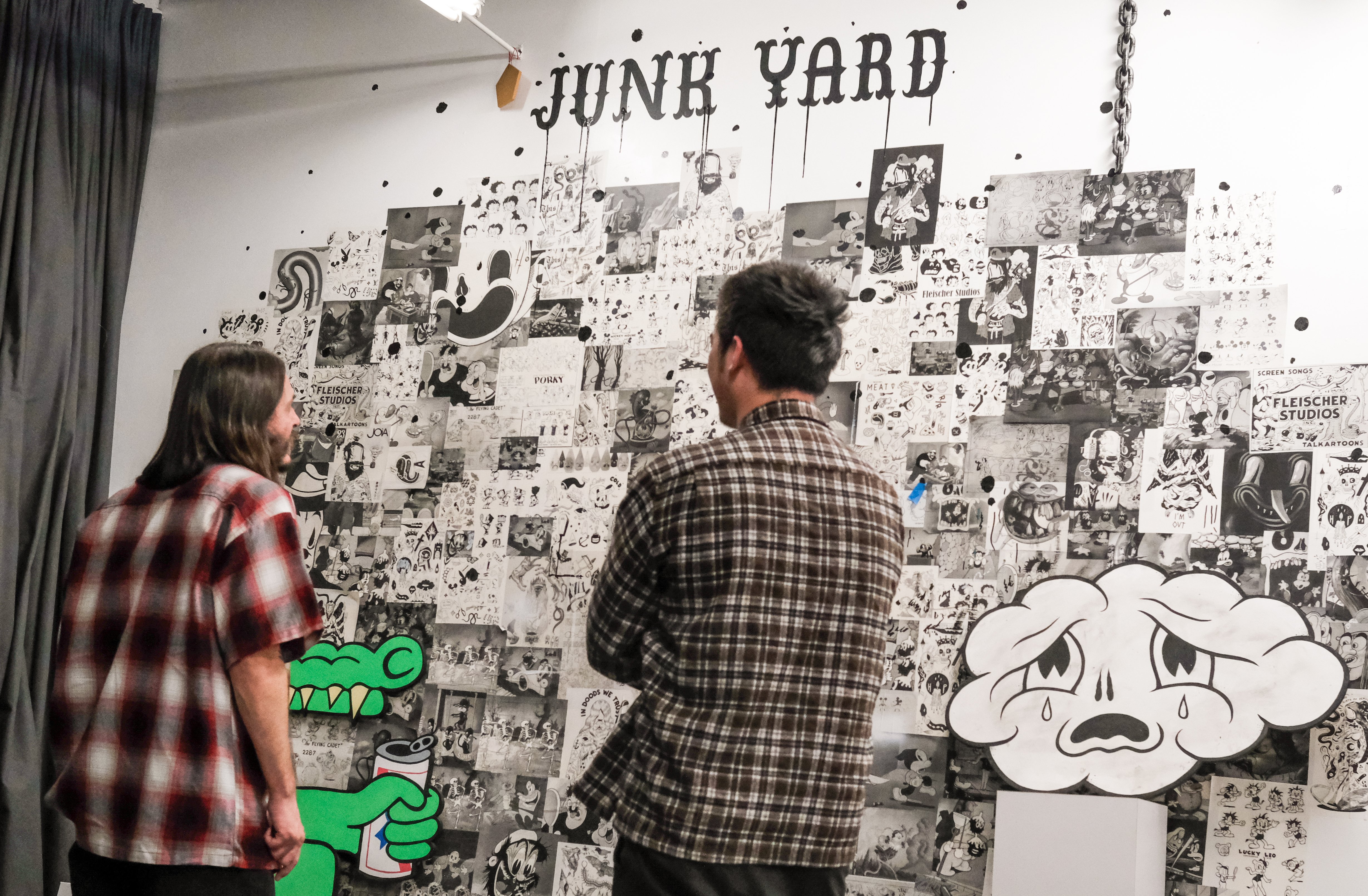
Photograph of JUNKYARD in his studio, courtesy of Chasm
What world do you vision your characters live in and how would you describe it?
This is a really good question and I talk about this a lot with friends of mine. I would say that my characters live in a rubber hose world that kind of looks like the backgrounds of Adventure Time. I love Adventure Time. That's one of my really big influences, especially the backgrounds. Just the way they're moved and shaped and how they're like oblong. They don't really make sense a lot of times and they really bend in shape. That's how I would like my world to look like. I'm still in the process of trying to figure out how I'm going to draw all of that. I've recently started adding some backgrounds, but I'm still working on that. It's still something I need to figure out.
You've illustrated and mashed up iconic characters such as Bimbo (which I own), Porky Pig, Scream, and SpongeBob. What draws you to a character to illustrate?
It's pretty simple. As soon as I look at a character and I think they look iconic, I will mess with them. And it doesn't necessarily have to be an old character. Even something like the Marshmallow Man from Ghostbusters. A lot of the time that's what I like to do. I like to take characters that are not that old and then turn them into the rubber hose style. But then I always add a dark element, you know? That's why we always see drool or blood coming out of the mouth or the eyes or there are tattoos on them.
.png?width=607&name=Group%2048095504%20(7).png)
Much of your art depicts iconic characters with smiles and happiness, but all with this dark undertone. Is that a conscious decision and what does that mean?
So most of the characters, if you look at them, they look like they're smiling, but they're not actually smiling. It's more like a chaotic smile, more crazed than happy. And that comes from me, I used to have really extreme anxiety. So basically, every time I draw a character, I'm like, "This is what I feel like, just extreme anxiety." And so when you go back and look at them now, every single character I draw, it's because they're literally insane. And that's just the smile that you're getting. It's not really like a smile of happiness, it's a smile of being completely insane.
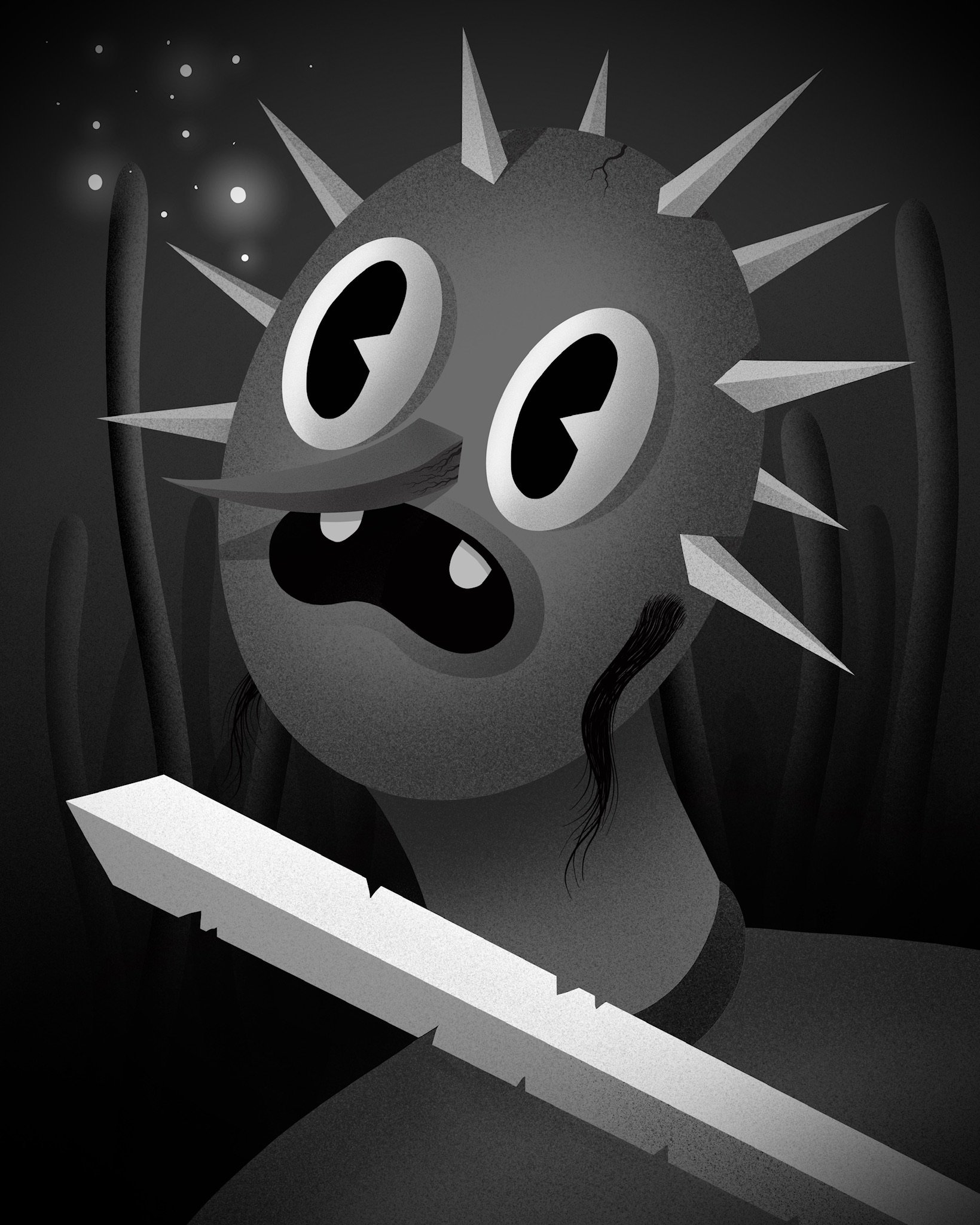
You recently got a 3D printer, what are you most excited about using it?
With the 3D printer, the whole point of that is to take all of my favorite characters and turn them into 3D. That's why I started learning Blender because I want to go from making my characters 3D to printing them. And really, all I want to do is just make 3D toys. When I was a boy I remember what it felt like to open the box and to hold that toy in my hand for the first time. It was the most amazing feeling ever. The toy really didn't feel like it was real. It was so cool.
To be able to do that by yourself with a 3D printer and then painting it by hand, I'm dying to do that. The process is intense, however. You print something for seven hours and then it's a failure and you have to clean everything up and start the process over again. And then you come to find that it's fucked up again and you have to go back. So it's not quick. It's like literally an eight-hour process, and then your test is a failure, and then you have to go from the start again.
You've posted this "baby coffin" on your Twitter before…
That was one of the tests! Out of all of them, only that little tiny one came out well. It came out so quick, so good. And then I posted it for fun on Twitter and it fucking blew up. That post is the most popular post I've made on Twitter and it's just like, of course. And now everyone wants a little tiny coffin. And like, it was a mistake. It's not supposed to be a tiny coffin. I do love it, though. I might actually print some more little ones.
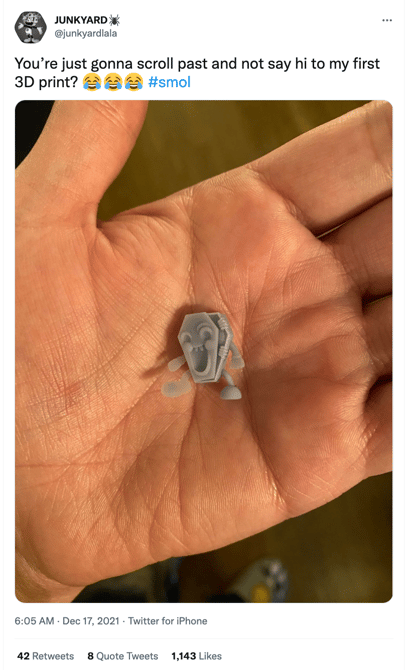
Along with KREEPTURE and TOMORROWMAN, you've grown your KREEPY KLUB community to over two thousand "homies". You have fans, but have you ever built this type of community before? And what has been the most rewarding aspect of it?
No, I've never built a community like this before. I've never even used Discord before NFTs. I had my own community on Instagram, but it's different when you have a community of people that you hang out with every day. I don't know how many other projects where the artists are hanging out with the people, but we try to hang out with people there. It's really nice, I mean, I love it.
I never knew that I was going to actually like Discord, you know, because I'm a pretty private person. I don't like a lot of people in my business and I don't have a big group of friends. But working on KREEPY KLUB, it's nice. I can just go in there and chill with everyone. These people all love our art and they're all huge fans. I've seen some other projects where people are stepping in their Discord's and the first thing they want to know is, "When's mint?" or "What's floor?" But with KREEPY KLUB, it's completely organic. We've never used any influencers, we've never used alpha channels. We actually try to avoid using any of those channels at all, we don't reach out to them or anything like that.
And it's all just people from our followings, from all the different social media platforms that are starting to join and vibe and chill with us. And these are all the same people that, for the most part, we would hang out with in real life, like they're really cool people. We're not the community that focuses on just pumping, pumping, pumping, you know? People are actually coming in there and hanging out. I'm almost in Discord all day. But the only thing I know about Discord is being in the general chat and talking to people. That's like my knowledge of Discord.
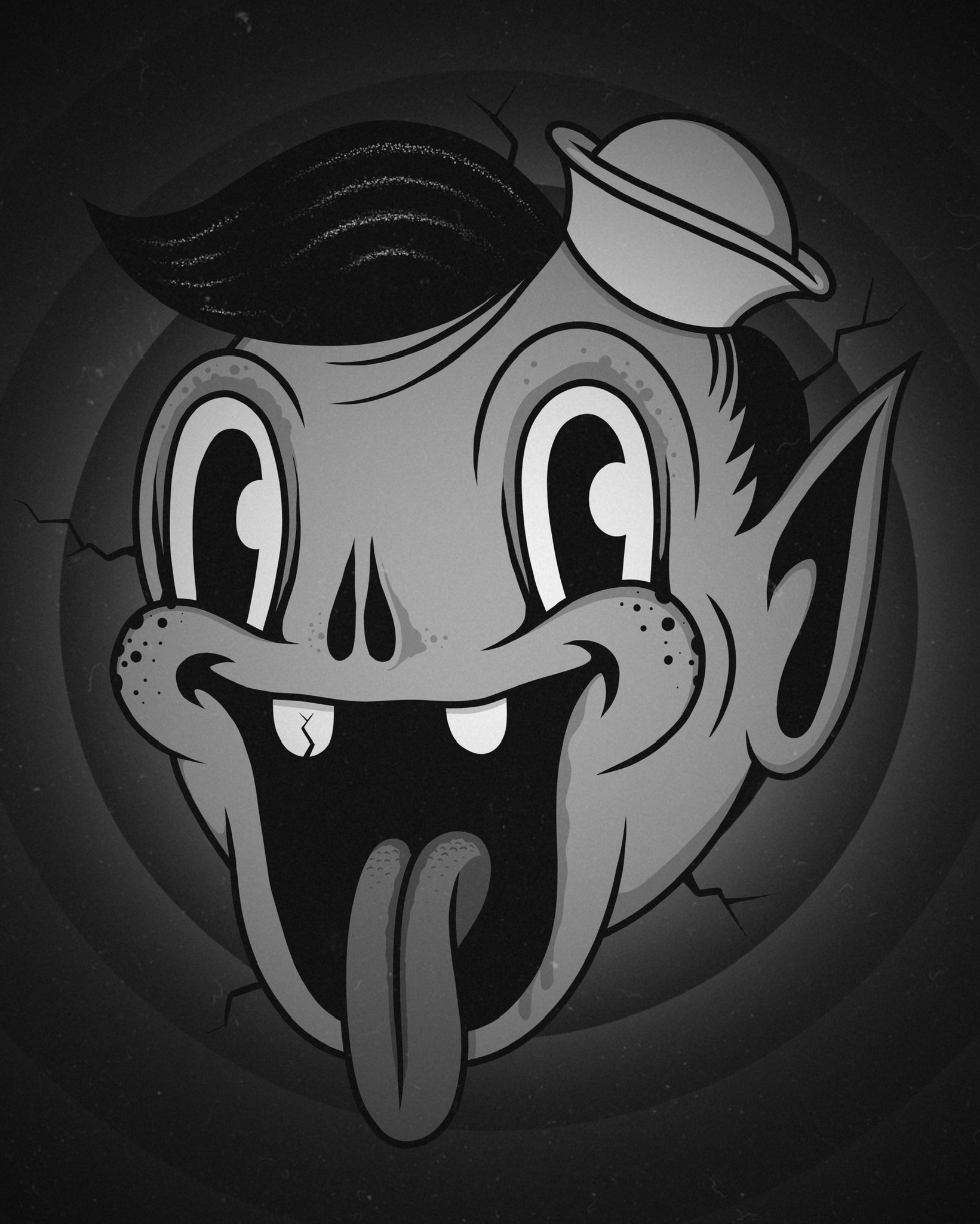 JUNKYARD, That's Not All Folks, unique NFT. Available on Blockparty. Image courtesy of the artist
JUNKYARD, That's Not All Folks, unique NFT. Available on Blockparty. Image courtesy of the artist
KREEPY KLUB is dropping soon in Q1 of 2022. Other than showcasing the art you've been working so hard on, what are you most excited for?
Most excited for the drop would be to start building out the in real life KREEPY KLUB. That's something that I am just dying to get started on. Like, I'm super excited. I want to get something that's maybe the size of this two thousand square foot studio, real clean, real nice, and then completely deck it out as KREEPY KLUB. Neon signs, cartoons on the wall, KREEPY KLUB art, our personal art everywhere, arcade room, lounge, merch room. I want to build a place where people can hang out, and have holder and non-holder events. Just getting something started in the real world because the whole point of KREEPY KLUB is not necessarily just an NFT project, right? KREEPY KLUB existed before NFTs. We're using NFTs to build a real-life brand.
How is releasing your art as NFTs different from showcasing them in galleries?
I mean, it doesn't really change that much because I'm just putting out my art regardless. I don't really have a strategy for creating or putting my art out. All I do is create art. If it's a gallery or if it's my market or if it's Blockparty, I will put my art out. I don't have a preference of how to put it out there. I just put it out constantly and as much as I can because I just want everyone to see it and I want everyone to own a piece of my art.
KREEP RADIO is by far my favorite Discord music channel. You also have a recurring concert in your Discord called KREEPFEST, so I can tell that music is a big aspect of KREEPY KLUB. What kind of music do you zone out to when you're drawing?
I listen to a little bit more like a synth-wave kind of stuff. I go in between synth wave and 80's metal and when I get sick of one, I start listening to the other one. One of my favorite albums to listen to while I draw is Tron Legacy. Because it's something where it's like orchestra music, but it's also electronic, so it's a good mix.
During the rest of the day, you don't want to see my Spotify mix, it's insane. It goes from Russian rap to bluegrass to Enya to Britney Spears to Boyz II Men to Pantera to Metallica to reggae to Skrillex. It's just everything, just all over the place, just from one song to the other. And then there's like some old Afrikaans music that I listen to. There's no rhyme or reason at all for my music tastes.
.jpg?width=6000&name=IMG_0977%20(1).jpg) JUNKYARD, Feeling Much Better, unique NFT. Available on Blockparty. Image courtesy of the artist.
JUNKYARD, Feeling Much Better, unique NFT. Available on Blockparty. Image courtesy of the artist.
If you had to choose one definitive character that you've drawn to best represent you, which one would it be and why?
It would probably be the Moon character, I feel like that's my character. It's always got the crazy smile that I like to draw. And I don't know what it is about the moon, I've always been fascinated by the moon and "Le Voyage das la Lune." I think it's from when I saw it as a kid, and honestly, if I think about it now, I think the first time I saw it was when there was a recreation of it in the "Tonight, Tonight" music video by The Smashing Pumpkins. Ever since, I've just been obsessed with the Moonhead. The character just keeps coming back and I think that's the one I relate to the most for some reason.
If you could bring back the rubber hose style into cartoons today, what aspects from the 1930s styles would you keep and which ones would you not use?
I think what I would do is keep how they wrote their stories, where it was just completely off the wall. That's why a lot of the cartoons that I actually like to watch, a lot of them don't really make too much sense, like SuperJail!, where it's just kind of crazy all over the place and with that bit of storyline. That's something that I really like. I don't always feel there has to be a point to something or like a reason for a certain scene. I feel like some people think a little too hard about why they create or what they want their art to represent. I just want it to look cool. And I just want other people to think it looks cool, too. So if I'm going to do my own rubber hose cartoon, all I'm going to focus on is making it look cool. And I just hope that everyone else thinks it's cool, too.

-1.jpg)
